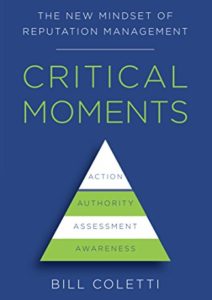Companies usually struggle to manage their reputation during the crisis. The key is to make smart moves to benefit the ones that matter the most to the company. In this Expert Insight interview, Bill Coletti discusses how to manage a company’s reputation in a crisis like this one. Bill Colleti is a professional development expert with more than 25 years of global experience in reputation management and crisis communication.
The interview discusses:
- Focusing on the Current Needs
- Responding to the Situation
- Conscious Decision Making
Focus on Current Needs
In crisis always follow ABC rule: Always Be Communicating. Everybody expects from leadership to be decisive, but the best thing to do is to communicate your current standpoints to the employees. For example, you can say that you are planning to bring people back to the office by Labor Day, but that you must leave space for flexibility because the situation changes easily. It is important not to get caught in the situation to choose between science and economics but to only focus on the organization’s well-being. Another important thing is to show genuine care for both employees and customers. The company needs to take a holistic approach where it manages the whole person. It will mean a great deal to employees if the organization puts effort to ensure that there is a daycare for the kids. From the customer’s perspective, reaching out to the customers to learn their current needs and creating personal relationships in the crisis time builds a great reputation for the company. This is a type of selling as well, and this human action approach will help the organization to grow stronger post-crisis.
Respond to the Situation
In a crisis, the key difference between good and great leaders is the speed of responding to the situation. The organization needs to stay truthful to its purpose and clear on its chain of command. Chain of command is usually a bit overlooked and that is okay if the leadership succeeds to be so clear to everyone in the organization to create an overall synchronization.
Good approach for a company of any size to practice handling the crisis is to open any page in New York Times during a staff meeting and pick a topic – and, then to discuss how they would handle that situation. This approach also helps to see how your employees think and where could they be placed in the chain of command pyramid.
Make Conscious Decisions
Crisis brings up different emotions in different people, and leadership cannot please everyone. The key is to go back to the organization’s mission and values and to make a conscious decision about which stakeholders matter the most. Speaking clearly and truthfully to the ones that matter the most will build the trust and ag along with the others as well.
Our Host
John is the Amazon bestselling author of Winning the Battle for Sales: Lessons on Closing Every Deal from the World’s Greatest Military Victories and Social Upheaval: How to Win at Social Selling. A globally acknowledged Sales & Marketing thought leader, speaker, and strategist. He is CSMO at Pipeliner CRM. In his spare time, John is an avid Martial Artist.








Comments